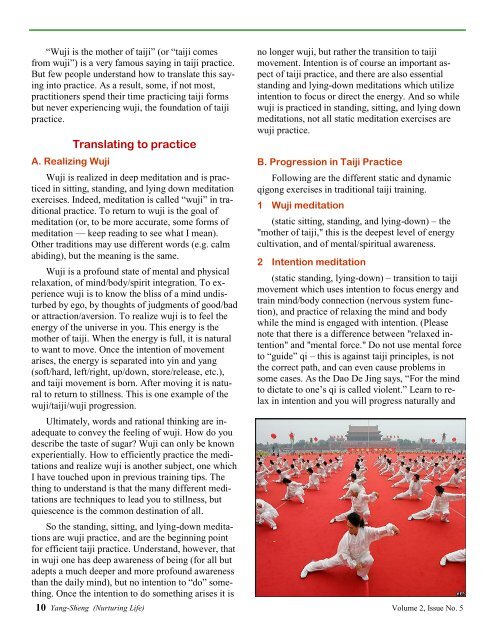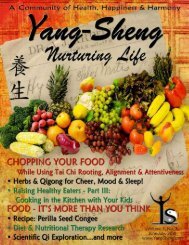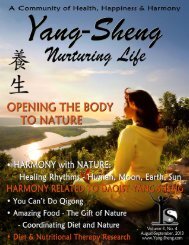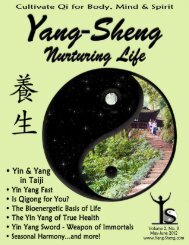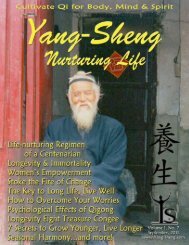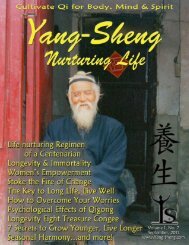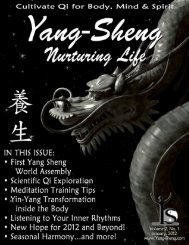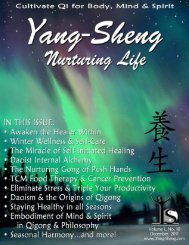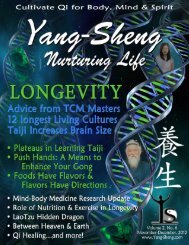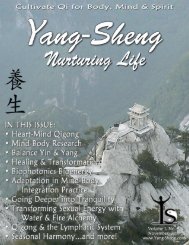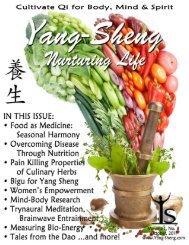Download - Yang-Sheng
Download - Yang-Sheng
Download - Yang-Sheng
Create successful ePaper yourself
Turn your PDF publications into a flip-book with our unique Google optimized e-Paper software.
“Wuji is the mother of taiji” (or “taiji comes<br />
from wuji”) is a very famous saying in taiji practice.<br />
But few people understand how to translate this saying<br />
into practice. As a result, some, if not most,<br />
practitioners spend their time practicing taiji forms<br />
but never experiencing wuji, the foundation of taiji<br />
practice.<br />
A. Realizing Wuji<br />
Translating to practice<br />
Wuji is realized in deep meditation and is practiced<br />
in sitting, standing, and lying down meditation<br />
exercises. Indeed, meditation is called “wuji” in traditional<br />
practice. To return to wuji is the goal of<br />
meditation (or, to be more accurate, some forms of<br />
meditation — keep reading to see what I mean).<br />
Other traditions may use different words (e.g. calm<br />
abiding), but the meaning is the same.<br />
Wuji is a profound state of mental and physical<br />
relaxation, of mind/body/spirit integration. To experience<br />
wuji is to know the bliss of a mind undisturbed<br />
by ego, by thoughts of judgments of good/bad<br />
or attraction/aversion. To realize wuji is to feel the<br />
energy of the universe in you. This energy is the<br />
mother of taiji. When the energy is full, it is natural<br />
to want to move. Once the intention of movement<br />
arises, the energy is separated into yin and yang<br />
(soft/hard, left/right, up/down, store/release, etc.),<br />
and taiji movement is born. After moving it is natural<br />
to return to stillness. This is one example of the<br />
wuji/taiji/wuji progression.<br />
Ultimately, words and rational thinking are inadequate<br />
to convey the feeling of wuji. How do you<br />
describe the taste of sugar? Wuji can only be known<br />
experientially. How to efficiently practice the meditations<br />
and realize wuji is another subject, one which<br />
I have touched upon in previous training tips. The<br />
thing to understand is that the many different meditations<br />
are techniques to lead you to stillness, but<br />
quiescence is the common destination of all.<br />
So the standing, sitting, and lying-down meditations<br />
are wuji practice, and are the beginning point<br />
for efficient taiji practice. Understand, however, that<br />
in wuji one has deep awareness of being (for all but<br />
adepts a much deeper and more profound awareness<br />
than the daily mind), but no intention to “do” something.<br />
Once the intention to do something arises it is<br />
no longer wuji, but rather the transition to taiji<br />
movement. Intention is of course an important aspect<br />
of taiji practice, and there are also essential<br />
standing and lying-down meditations which utilize<br />
intention to focus or direct the energy. And so while<br />
wuji is practiced in standing, sitting, and lying down<br />
meditations, not all static meditation exercises are<br />
wuji practice.<br />
B. Progression in Taiji Practice<br />
Following are the different static and dynamic<br />
qigong exercises in traditional taiji training.<br />
1 Wuji meditation<br />
(static sitting, standing, and lying-down) – the<br />
"mother of taiji," this is the deepest level of energy<br />
cultivation, and of mental/spiritual awareness.<br />
2 Intention meditation<br />
(static standing, lying-down) – transition to taiji<br />
movement which uses intention to focus energy and<br />
train mind/body connection (nervous system function),<br />
and practice of relaxing the mind and body<br />
while the mind is engaged with intention. (Please<br />
note that there is a difference between "relaxed intention"<br />
and "mental force." Do not use mental force<br />
to “guide” qi – this is against taiji principles, is not<br />
the correct path, and can even cause problems in<br />
some cases. As the Dao De Jing says, “For the mind<br />
to dictate to one’s qi is called violent.” Learn to relax<br />
in intention and you will progress naturally and<br />
10 <strong>Yang</strong>-<strong>Sheng</strong> (Nurturing Life) Volume 2, Issue No. 5


